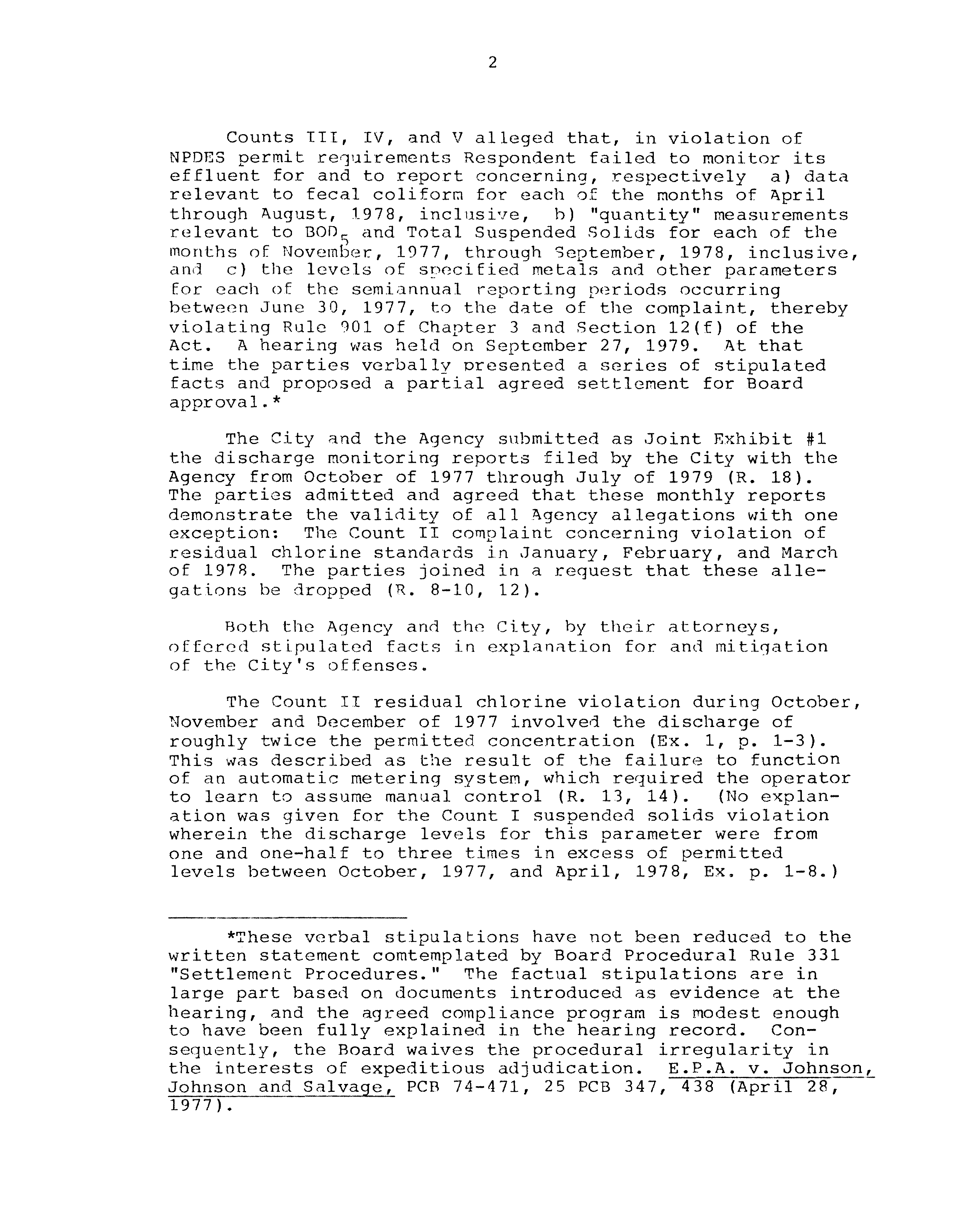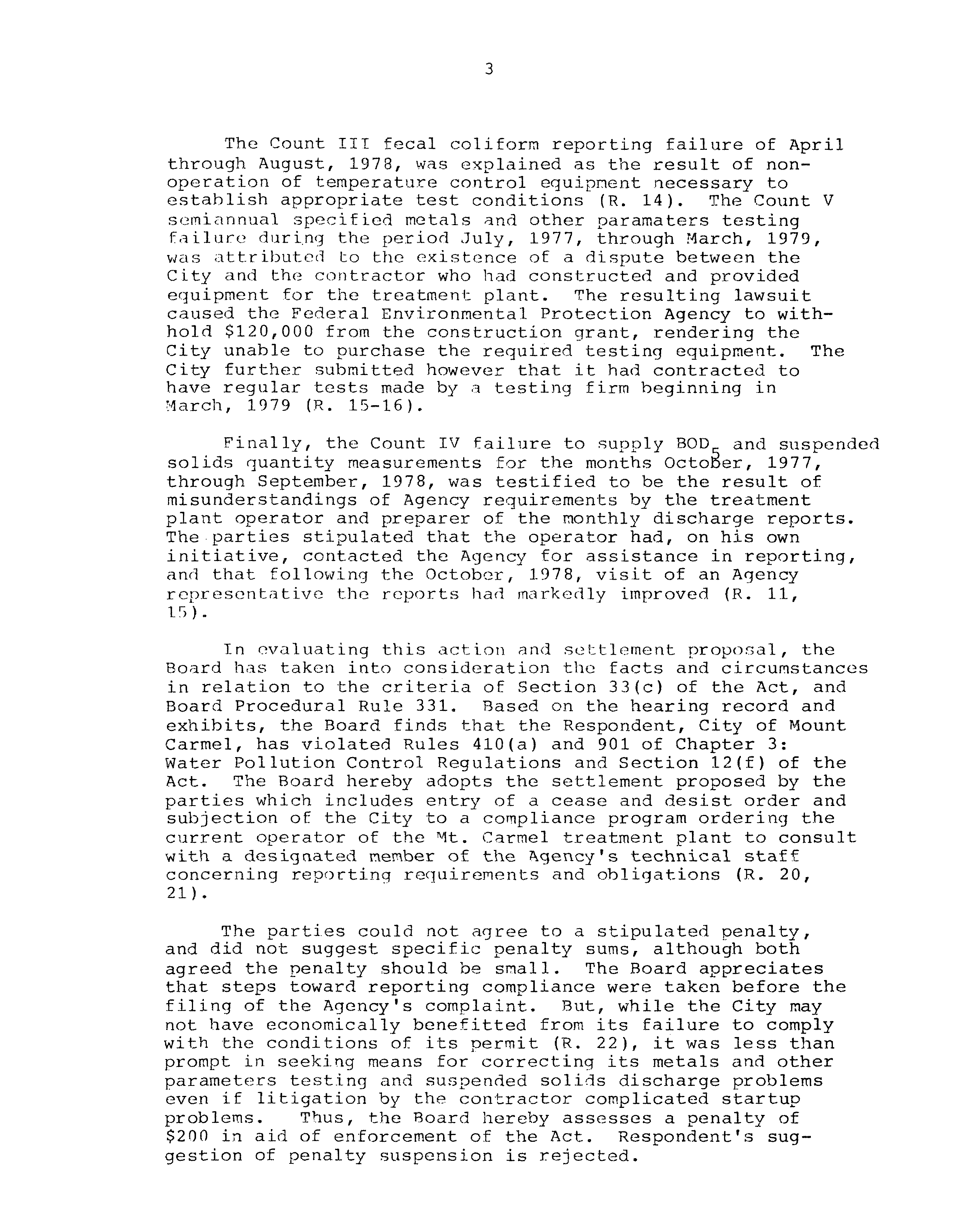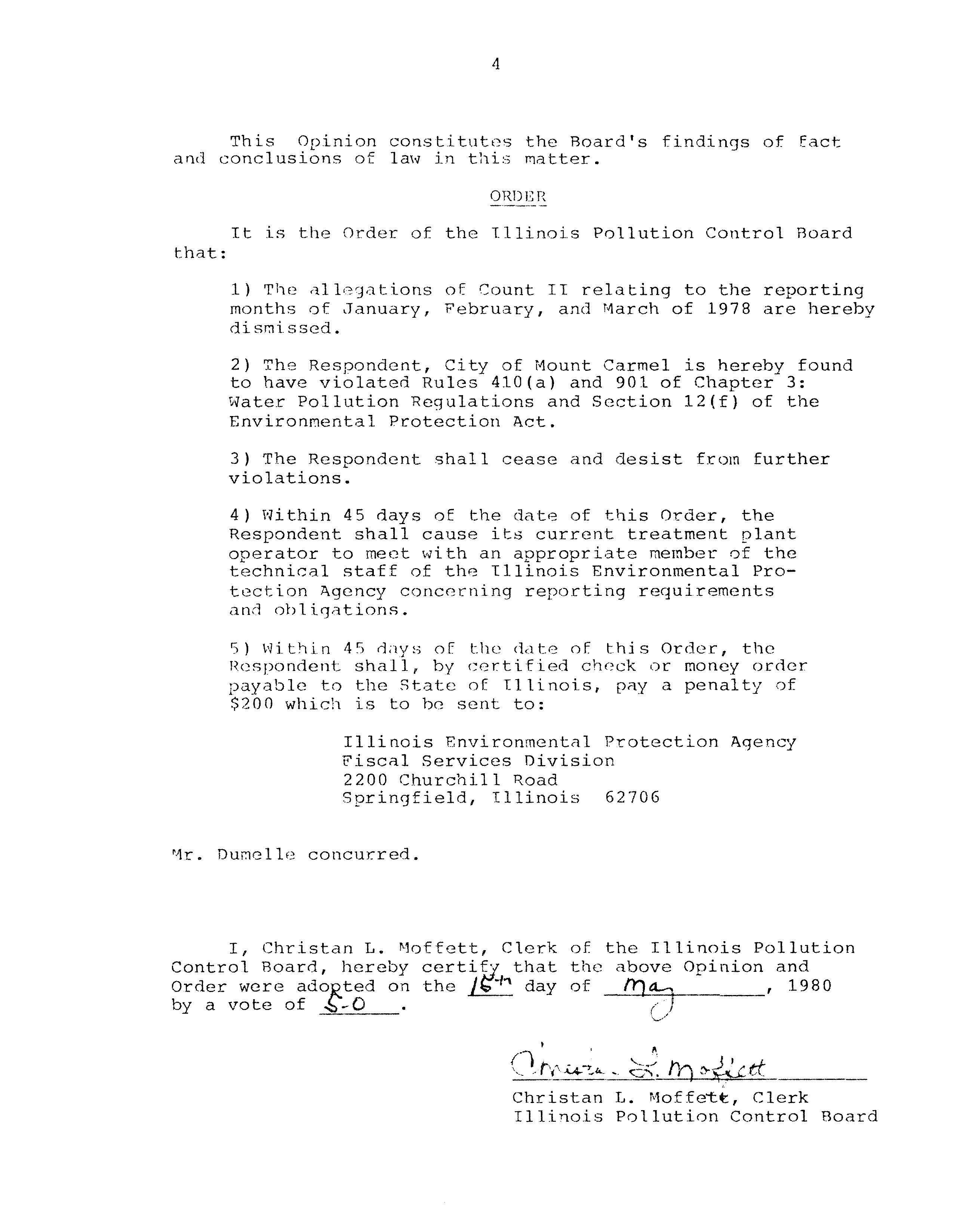IT~t1INOIS
POLLUTION
CONTROL
BOARD
Nlay
15,
1980
¶
N VIRONM
UNTAL
PROT UCT TOP
AGENCY
,
Complainant,
v.
)
PCB
79—44
CITY
OF
MOUNT
CARMEL
Respondent.
MR.
REED
~7.
NEUMAN,
ASSISTANT
ATTORNEY
GENERAL,
APPEARED
ON
BEHALF
OF
TUE COMPLAINANT.
MR.
ROBERT
1.
KEENAN,
JR.,
O~’ TOWNSEND,
TOWNSEND
&
~EENAN
APPEARED
ON
BEHALF
OF
TUE
RESPONDENT.
OPINION
AND
ORDER
OF
THE
BOARD
(By
J.
Anderson):
This
matter
comes
before
the
Board
upon
the
March
2,
1979, Complaint
brought
by
the Illinois Environmental
Protection Agency
(“Agency”).
The Respondent,
the City of
Mount Carmel
(“City),
is an Illinois municipal
corporation
which owns and operates a wastewater treatment facility
located
in Wabash County.
The wastewater treatment plant
discharges contaminants into the Wabash River pursuant to
its NPDES permit.
The Complaint charges the City with two types of offenses:
violation of effluent standards and violation
of monitoring
and reporting requirements.
Count
I
of ~he complaint alleged that
in the months of
October,
1977,
through 7~pri1, 1978,
inclusive the Respondent
allowed
the discharge
from its wastewater treatment facility
of
effluents containing suspended
solids
in
excess of the
limitations contained
in its NPDES Permit
in violation of
Rule 410(a)
of Chapter
3:
Water Pollution Control Regulations
(“Chapter
3”), and Section
12(f) of the Illinois Environmental
Protection Act
(‘tAct”).
Count II alleged that in the months of October,
1977,
through March,
1978, the Respondent allowed the discharge of
effluents exceeding the maximum chlorine residual concen~
tratiori
limits contained
in
its NPDES Permit in violation of
Rule 410(a) of Chapter
3 and Section 12(f)
of the Act.
2
Counts III,
IV,
and V alleged that,
in violation of
NPDES permit requirements Respondent failed
to monitor its
effluent for and to report concerning,
respectively
a) data
relevant to fecal coliform for each
of the months of April
through
August,
1978,
inclusi’~e,
b)
“quantity” measurements
relevant to BOO5 and Total Suspended Solids for each of the
months of November,
1977,
through September,
1978,
inclusive,
and
c)
the levels
of snecified metals and other parameters
for each of the semiannual
reporting periods occurring
between June
30,
1977,
to the date of the complaint,
thereby
violating Rule 901 of Chapter
3 and Section 12(f)
of the
Act.
A hearing was
held
on September
27,
1979.
At that
time
the parties verbally presented
a series of
stipulated
facts and proposed
a partial agreed settlement
for Board
approval
.
*
The City and the Agency submitted
as Joint Exhibit
#1
the discharge monitoring reports filed by the City with the
Agency
from October of 1977 through July of 1979
(R.
18).
The parties admitted and agreed that these monthly reports
demonstrate
the validity
of all Agency allegations with one
exception:
The Count
II complaint concerning violation of
residual chlorine standards
in January,
February, and March
of
1978.
The parties joined
in a request that these alle-
gations he dropped
(R.
8—10,
12).
Both the Agency
arid
the
City,
by their attorneys,
offered stipulated facts
in explanation for and mitigation
of the City’s offenses.
The Count
II residual chlorine violation during October,
November and December of 1977 involved the discharge of
roughly twice the permitted concentration
(Ex.
1,
p.
1—3).
This was described as the result of the failure
to function
of an automatic metering system, which required the operator
to learn
to assume manual control
(R.
13,
14).
(No explan-
ation was given for the Count
I suspended solids violation
wherein the discharge levels for this parameter were from
one and one-half to three times
in excess of
permitted
levels between October,
1977,
and April,
1978,
Ex,
p.
1—8.)
*These verbal stipulations have not been reduced to the
written statement comtemplated by Board Procedural Rule 331
“Settlement Procedures.”
The factual
stipulations are
in
large part based on documents introduced
as evidence at the
hearing,
and the agreed compliance program
is modest enough
to have been
fully explained in the hearing record.
Con-
sequently,
the Board waives the procedural
irregularity
in
the interests of expeditious adjudication.
E.P.A.
v.
Johnson,
Johnson and Salvage, PCB 74—471,
25 PCB 347,
438
(April 28,
1977).
3
The Count lIT fecal coliform reporting failure
of April
through August,
1978,
was explained
as the result of non-
operation
of temperature control equipment necessary
to
establish appropriate test conditions
(R.
14).
The Count V
semiannual specified metals and other paramaters testing
failure during the period July,
1977, through March,
1979,
was
attrihutc~
to
the existence of
a dispute between the
City
and
the
contractor
who
had constructed and provided
equipment for the treatment plant.
The resulting
lawsuit
caused the Federal Environmental Protection Agency
to with-
hold $120,000 from the construction grant, rendering the
City unable
to purchase the required testing equipment.
The
City further submitted however that
it had contracted
to
have regular tests made
by
a testing firm beginning
in
March,
1979
(R.
15—16).
Finally,
the Count
IV failure to supply BOD
and suspended
solids quantity measurements
for the months Octo~er, 1977,
through September,
1978,
was testified to be the result
of
misunderstandings of Agency requirements by the treatment
plant operator and preparer
of the monthly discharge reports.
The parties stipulated that the operator had, on his own
initiative, contacted
the Agency for assistance in reporting,
and that
following the October,
1978,
visit of an Agency
representatIve the reports had markedly improved
(R.
11,
15).
In
evaluating this action and settlement proposal, the
Board has taken
into consideration the facts and circumstances
in relation to the criteria of Section 33(c)
of the Act,
and
Board Procedural Rule
331.
Based on the hearing record and
exhibits,
the Board
finds that the Respondent, City
of Mount
Carmel, has violated Rules 410(a) and
901 of Chapter
3:
Water Pollution Control Regulations and Section 12(f)
of
the
Act.
The Board hereby adopts the settlement proposed by the
parties which includes entry of a cease and desist order and
subjection of the City
to a compliance program ordering the
current operator of
the Mt. Carmel treatment plant to consult
with a designated member of the Agency’s technical staff
concerning reportlnq requirements
and obligations
(R.
20,
21).
The parties could not agree to a stipulated penalty,
and did not suggest specific penalty
sums,
although both
agreed the penalty should he small.
The Board appreciates
that steps toward reporting compliance were taken before the
filing of the Agency’s complaint.
But, while the City may
not have economically benefitted
from its failure to comply
with the conditions
of
its permit
(R.
22),
it was less than
prompt
in seeking means
for correcting
its metals and other
parameters
testing and suspended solids discharge problems
even
if litigation by the contractor complicated startup
problems.
Thus, the Board hereby assesses a penalty
of
$200 in aid of enforcement of the Act.
Respondent’s sug-
gestion
of penalty suspension
is rejected.
4
This
Opinion constitutes the Board’s findings of fact
and conclusions of law in this matter.
ORDER
It is the Order of the Illinois Pollution Control Board
that:
1) The allegations of Count It relating to the reporting
months of January, February, and March of 1978 are hereby
dismissed.
2) The Respondent, City of Mount Cannel is
hereby
found
to have violated Rules 410(a) and 901 of Chapter
3:
Water Pollution Regulations and Section 12(f) of the
Environmental Protection Act.
3) The Respondent shall cease and desist from further
violations.
4) Within 45 days of the date of this Order, the
Respondent shall cause its current treatment plant
operator to meet with an appropriate
member
of the
technical staff of the Illinois Environmental Pro-
tection Agency concerning reporting requirements
and obligations.
5) Within 45 days of the date of this Order, the
Respondent shall, by certified check or money order
payable to the State of Illinois,
pay a penalty of
$200 which is to be sent to:
Illinois Environmental Protection Agency
Fiscal Services Division
2200 Churchill Road
Springfield,
Illinois
62706
Mr. Dumelle concurred.
I, Christan L. Moffett, Clerk of the Illinois Pollution
Control Board, hereby certify that the above Opinion and
Order were adopted on the
1C”
day
of
if)
,
1980
byavoteof
4-0
.
-
fri
Christan L. Moffett, Clerk
Illinois Pollution Control Board




